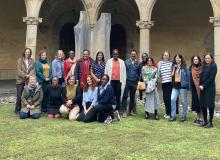Creating socio-legal conversations about justice – Methods and Mobilization –
Coordinadores: Annie Bunting (Law & Society, York University), Jennifer Balint (University of Melbourne)
Descripción del encuentro
Law and society scholars, generally, are engaged across a variety of contemporary contexts with systems of power and inequality in society. Patterns of colonisation, structures of racial and gender inequality, for example, challenge law and society scholars to produce knowledge that contributes positively to larger struggles for social and political justice. Traditional methods of scholarship too often risk failing to produce research meaningful to these struggles. Law and society practice often focuses on impact and change (e.g. community legal clinics and cause lawyering), and while much law and society work engages with communities (e.g. migrant workers, post-conflict societies, LGBTQi folks, sex workers), community-engaged research as a methodology of socio-legal work is not too often adequately reflected on. Community-based and responsive scholarship is an obvious focus for more diverse, creative, and sustained study.
This Workshop brings together international scholars at the IISL to critically interrogate PAR and socio-legal activist research. We have gathered a remarkable group of researchers: five doctoral students, two postdoctoral fellows, emerging scholars, senior scholars. Participants come from Australia, Canada, Columbia, DR Congo, France, Indonesia, Musqueam First Nation, Nuxalk Nation, Peru, Puerto Rico, Uganda and the United States. The work of the group convened for the Workshop is diverse and exciting, drawing on different strands of the PAR tapestry (Indigenous, critical race, anti-colonial or feminist). All are animated by commitment to collaboration, social justice, and community benefits. Critically, our group includes Indigenous scholars allowing contemplation of Indigenous research as a critical lens.
Nuestra experiencia en Oñati
We could not have asked for a better environment in which to bring together 20 researchers at all career levels from 12 countries and nations to discuss community-based, social justice research. From the moment that our workshop was chosen by the Institute, Malen and her team were responsive and professional. They helped with communication with participants, funding application letters of support, visas, posting papers, lunch and dinner reservations, and on-the-ground organization from the moment we all descended on Oñati. It was a magical few days. We had held three pre-workshop zoom seminars, so participants slid effectively into intellectual engagement with each other.
Discussion was rich and stimulating. The focus was on community and participatory research methodology, with a wide range of topics canvased. For illustrations, the workshop covered the ethical dilemmas of doing research in post-conflict settings, justice as methodology, and diverse methods of knowledge dissemination. Indigenous perspectives shaped key pieces of the discussion and considerations of collaboration with civil society organizations provided interesting context to many of the presentations.
The Antia Residence was affordable and welcoming. The Residence enhances community for workshop participants – more so than if we had been staying in a hotel. We bought some breakfast foods to be available in the kitchen; tea and coffee were there for jet-lagged travelers.
The Institute’s meeting room was set up with personalized water bottles and notebooks. Since one of our participants did not secure a visa to attend in person, Malen organized the Zoom link and Owl camera so that they could participate. While not ideal, it was the next best thing. We really appreciated the efforts the staff went to help us include our contributors in the conversation. What was produced was an enduring collaborative community across lines of scholarship and friendship.
Workshop Coordination Team
Avenida de la Universidad, 8
Apartado 28
20560 Oñati (Gipuzkoa) - Spain
T: +34 943 78... Ver teléfono
E: workshop@iisj.es




